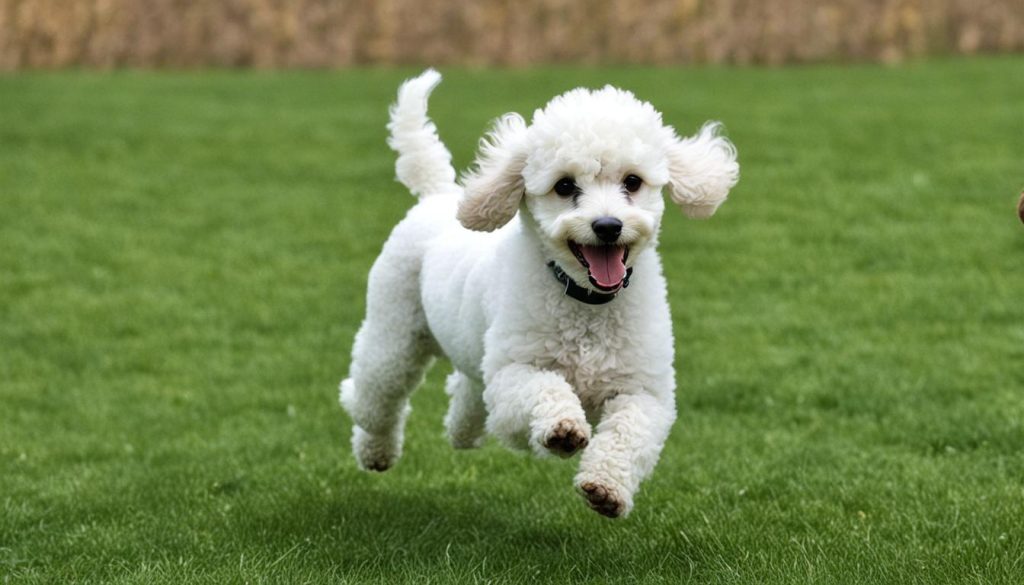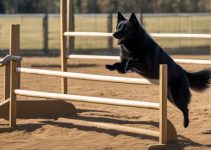As a proud Poodle owner, I have come to appreciate the unique characteristics and charming personality of these intelligent and loyal dogs. However, just like any other breed, Poodles can sometimes exhibit behavior problems that require attention and understanding.
By comprehending the common issues in Poodles and having the right tools at hand, we can effectively manage their behavior and create a harmonious living environment. Whether it’s hyperactivity, separation anxiety, or disobedience, there are solutions that can help.
One essential aspect of managing Poodle behavior is obedience training. Poodles thrive on mental stimulation and enjoy learning and following commands. With consistent training techniques and positive reinforcement, we can shape their behavior and ensure they become well-behaved companions.
Additionally, behavior modification techniques can be applied to address specific issues such as chewing, nipping, jumping, growling, marking, begging, and more. Through patience, consistency, and understanding, we can guide our Poodles towards better behavior.
By acknowledging and addressing these common behavior problems, we can enhance the overall well-being of our beloved Poodles and strengthen the bond between ourselves and our furry friends.
Sleep Patterns in Poodles
When it comes to their sleep patterns, Poodles have unique habits and requirements that every owner should be aware of. Poodle puppies, in particular, have a greater need for sleep, ranging from 15 to 20 hours per day. As they grow older, their sleep needs gradually decrease, and adult Poodles typically sleep for around 13 hours. However, it’s important to note that senior Poodles may require additional naps throughout the day.
To ensure your Poodle gets the rest they need, it’s essential to provide them with a comfortable and quiet space for sleeping. This can be a cozy bed or a designated area where they feel safe and secure. A peaceful environment promotes relaxation and contributes to their overall well-being.

It’s not uncommon for Poodles to take naps, especially if they are left alone for extended periods. These short periods of rest can help them recharge and maintain their energy levels. Napping is a natural behavior for Poodles and allows them to rest and rejuvenate throughout the day.
Understanding your Poodle’s sleep patterns is crucial for their physical and mental health. By accommodating their sleep requirements and providing a suitable environment, you can ensure that your Poodle is well-rested and ready to take on the day with energy and enthusiasm.
Common Behaviors in Poodle Puppies
During the various stages of growth and development, Poodle puppies commonly display certain behaviors. It’s important for puppy owners to understand and address these behaviors to ensure a well-rounded and happy furry companion.
One common behavior in Poodle puppies is hyperactivity. These little bundles of energy may have bursts of excitement and engage in playful activities. This hyperactivity is a normal part of their development and should be channeled into appropriate outlets.
Another behavior seen in Poodle puppies is clinginess. They may prefer to stay close to their owners rather than explore their surroundings. This clinginess is often a reflection of their affectionate nature and desire for companionship.
Separation anxiety can be a challenge for Poodle puppies. They may experience distress when left alone, leading to excessive whining or destructive behaviors. It’s important to gradually acclimate them to being alone and provide reassurance.
Poodle puppies also tend to chew and nip as they explore the world with their mouths. This behavior is natural and helps with teething, but it’s crucial to redirect their chewing to appropriate toys and discourage nipping to prevent any potential harm.

In summary, Poodle puppies can exhibit hyperactivity, clinginess, separation anxiety, chewing, and nipping. As responsible puppy owners, it’s essential to provide them with proper guidance, redirection, and outlets for their energy to foster a well-behaved and happy Poodle companion.
Addressing Common Behavioral Issues
Poodles are known for their intelligence and loyalty, but they may also exhibit common behavioral issues that require attention and training. By understanding and addressing these behaviors, owners can help their Poodles become well-behaved and happy companions.
Excessive Barking
Barking is a natural form of communication for Poodles, but excessive barking can be a nuisance. To manage this behavior, consistent training and mental stimulation are key. Engaging in regular exercise, providing interactive toys, and teaching the “quiet” command can help redirect your Poodle’s excessive barking.
Fearfulness
Fearfulness is another common issue that some Poodles may experience. Socialization is crucial in helping them overcome their fears. Gradually exposing your Poodle to new experiences, people, and environments can help build their confidence and reduce fearfulness.
Growling, Marking, Begging, and Disobedience
Growling, marking, begging, and disobedience can be addressed through positive reinforcement training techniques. Establishing clear boundaries and consistently rewarding positive behaviors can help correct these issues. For example, teaching your Poodle the “leave it” command can discourage begging, while providing proper potty training and consistent routines can address marking behavior.
Remember, addressing these common behavioral issues in Poodles requires patience, consistency, and understanding. With proper training and guidance, your Poodle can become a well-adjusted and obedient companion.
Poodle Training and Aggression
As a proud Poodle owner, I understand the importance of proper training and addressing aggression in these intelligent and loyal dogs. Poodles are known for their receptive nature towards obedience training, thanks to their high intelligence. However, it’s essential for owners to be mindful of encouraging mischievous behaviors in their Poodles.
While Poodles are not typically aggressive by nature, they can develop anxiety that may lead to aggressive behaviors. This is why socialization plays a crucial role in their upbringing. By exposing Poodles to different environments, people, and other dogs at an early age, they learn how to interact and recognize them as companions.
When it comes to training, it should be firm yet kind, avoiding any form of cruelty or physical punishment that can worsen existing problems. Consistency is key in Poodle training – establishing clear boundaries and enforcing them consistently will ensure that your Poodle understands and respects them.
Positive reinforcement is a powerful tool in shaping Poodle behavior. Rewarding desired actions and behaviors with treats, praise, and affection will motivate your Poodle to continue displaying those behaviors. This not only strengthens the bond between you and your furry companion but also facilitates a harmonious living environment.
Remember, training a Poodle takes time and patience. Each dog is unique, and what works for one may not work for another. It’s important to tailor your training approach to fit your Poodle’s personality and temperament.
By understanding the needs of your Poodle and providing adequate training, socialization, and positive reinforcement, you can cultivate a well-mannered, obedient, and loving companion that brings joy to your life and the lives of others.
Poodle Characteristics and History
Poodles are renowned for their remarkable intelligence, athleticism, and unwavering loyalty. This beloved breed comes in three distinct sizes: Standard, Miniature, and Toy. Regardless of size, Poodles possess a unique, curly coat that demands regular grooming and is available in an array of captivating colors.
Originating in Germany, Poodles were initially bred as skilled hunting and retrieving dogs. However, their exceptional traits and charm quickly captured the hearts of dog enthusiasts in France, where they were eventually declared the national breed. Today, Poodles are celebrated for their versatility and exceptional abilities in various activities such as obedience, agility, and therapy work.
Not only are Poodles highly accomplished in performance tasks, but they also possess a remarkable temperament that makes them ideal family and companion dogs. Known for their affectionate and friendly nature, Poodles form strong bonds with their human companions. Beyond their amiable demeanor, Poodles boast a long lifespan, offering lasting joy and companionship to their families.






